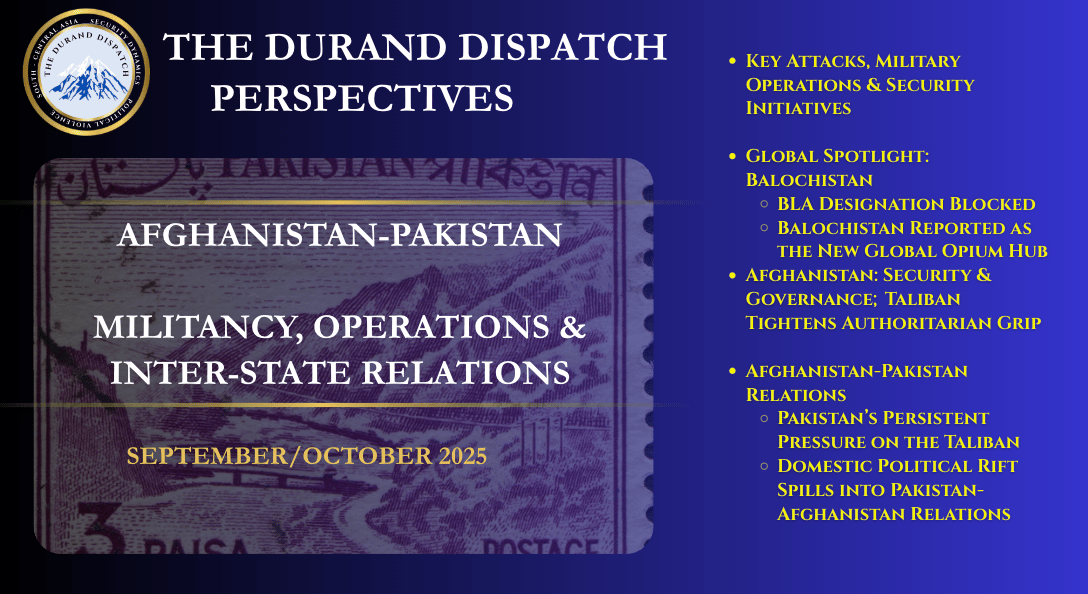

Editor’s Note
Welcome to Durand Dispatch: Perspectives, our monthly analysis offering insights into security and militancy trends across South and Central Asia, with a special focus on the Afghanistan-Pakistan region. This issue, one of three this month, covers key developments during September 2025 regarding:
Escalating militant attacks, military operations, and security initiatives across Pakistan
Global spotlight on Balochistan amid diplomatic setbacks and emerging narcotics concerns
Afghanistan's governance under intensifying Taliban authoritarian control
Deteriorating Afghanistan-Pakistan relations marked by persistent Pakistani pressure and domestic political fractures
Our next two Perspectives issues will focus on Pakistan: Civil Unrest & Political Mobilization and South-Central Asia: Diplomacy, Economics and Security.
Overview of Key Developments
September 2025 saw Pakistan's security crisis deepen further following August's designation as the deadliest month in recent years, with a notable trend of militants systematically targeting Federal Constabulary infrastructure in both Khyber Pakhtunkhwa and Balochistan. Vehicle-borne attacks struck FC headquarters in Bannu on September 2 and Quetta later in the month, killing at least 10 in Quetta alone in one of the year's most sophisticated operations, demonstrating coordinated targeting of paramilitary installations across provinces. Mid-September operations near the Afghan border killed 19 Pakistani soldiers in a single day, prompting Prime Minister Sharif to demand the Taliban choose between Pakistan and the TTP.
Political Fractures Tensions increased as Khyber Pakhtunkhwa Chief Minister Gandapur openly opposed military operations, advocating dialogue with Afghanistan instead—contradicting federal policy. The systematic targeting of secular political voices continued with ANP activist killed in Bajaur, while an alleged aerial strike in Tirah killing approximately 25 civilians sparked condemnation and demands for inquiry. In Balochistan, beyond the coordinated FC attacks, a suicide bombing at a BNP-Mengal rally and coordinated strikes in Turbat and Chaman demonstrated escalating separatist violence, though the reported killing of BLA Majeed Brigade commander Ustad Mureed in Afghanistan dealt a significant blow to militant command structures.
Global Spotlight on Balochistan The global spotlight turned to Balochistan as Western powers blocked Pakistan-China efforts to designate the BLA at the UN—a diplomatic setback, amid reports that Balochistan has emerged as the world's new opium hub following the Taliban's Afghanistan poppy ban, potentially funding militant operations. Despite new institutional mechanisms and U.S. pressure for defense budget oversight, Pakistan's counterterrorism approach remained divided between force and dialogue.
Taliban Crackdown September saw an intensification of Taliban authoritarian control through systematic restrictions across information, women's rights, civil society, and education. The regime implemented a nationwide internet shutdown by September 29 citing "immorality," while simultaneously banning Afghan women from UN agencies during the earthquake crisis that killed over 2,200 people, arresting civil activists and Sufi leaders, removing curriculum lessons on women's and human rights, banning university textbooks including all works by women, and shutting down media operations—revealing prioritization of ideological purity over functional governance despite Interior Minister Haqqani's contradictory calls for "building public trust."
Afghanistan-Pakistan Relations. Relations deteriorated to their lowest point since April's diplomatic reboot, with Pakistan accusing the Taliban of hosting 8,000 TTP militants and delivering ultimatums to "choose between Pakistan and TTP" or face hostile treatment. Pakistan's domestic political crisis created parallel diplomatic channels as PTI positioned itself as alternative interlocutor with Kabul, undermining official policy, while a Taliban cleric's video declaring jihad against Pakistan revealed internal ideological divisions complicating security cooperation. Despite September initially marking the first month since November 2024 without cross-border firings and the reopening of Angoor Adda crossing offering trade optimism, renewed October hostilities and fundamental disagreements over militant sanctuaries kept bilateral relations precarious.
Download the Durand Dispatch Perspectives (September/October) issue here.



Trusted by millions. Actually enjoyed by them too.
Most business news feels like homework. Morning Brew feels like a cheat sheet. Quick hits on business, tech, and finance—sharp enough to make sense, snappy enough to make you smile.
Try the newsletter for free and see why it’s the go-to for over 4 million professionals every morning.




